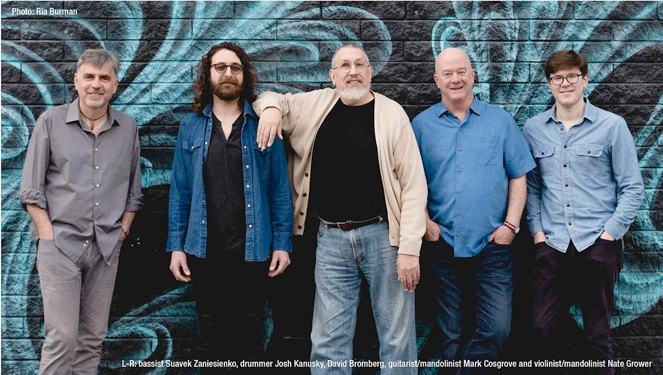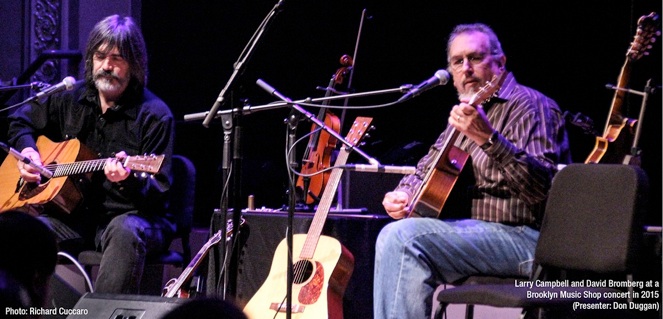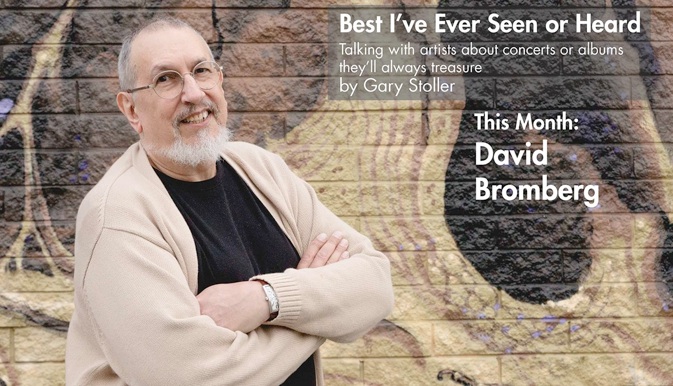Millions of Americans regard Bob Dylan as a treasured national resource, but there are many lesser known American rock, folk and country musicians who have provided their artistry for decades and deserve the same status. Chris Hillman, Tom Rush, Eric Andersen and David Bromberg immediately come to mind.
“Well, I’m very flattered to be thought of with those people,” Bromberg responds when I mention this to him, “but the truth is what I contributed most to the American music scene has never crossed my mind. I really don’t have an overview and, usually when I do interviews, I try to warn the interviewer to not ask me overview questions, because I’m incapable of answering them.”
Call him modest, a realist or philosophical, but Bromberg, whose music has always been a mixture of blues, folk, rock, bluegrass, country and other American roots music, then ventures an explanation.
“I guess I can best explain it by telling you that, when I was a kid, I had a neighbor, a classmate of my brother’s father, who had a great blues record collection. I used to go on weekends to record them and put them on a tape recorder, and then I also recorded every album I had. I don’t know why, but, at one point, I realized I was putting all my attention into recording things and not enjoying it. So, as a result, I’m not interested in looking at forests. I’m too busy looking at the trees. I find them fascinating.”
Perspective aside, Bromberg, who will release his next album, Big Road, on April 17, has been delivering the goods since the 1960s, and his live performances today are as adept, powerful and creative as they were in the past.
Bromberg, a multi-instrumentalist who was an accomplished session guitarist in the sixties before releasing his first album in 1971, tells me his musical adventures began at either age 7 or 8 when, “for some bizarre reason — I have no idea why” — he wanted to play a flute.
“Of course, at 7 or 8, you can’t really finger on a flute and you need something smaller, so I started out on a recorder and then piccolo,” he recalls. “When my hands were big enough, I played flute and took lessons. After a while, I got really interested in music I heard on the radio. My brother played classical guitar, and I wanted to play guitar — not classical — but I didn’t want to compete with him.
“So, when I was 13 and got the measles and got bored, I borrowed one of his guitars and one of his music books and started teaching myself guitar. I had a big, important moment at one point when I was, maybe, 14. I was going to New York City, and my mom drove me to the railroad station. This Sleepy John Estes thing was running through my head, and, all of a sudden, I saw exactly how he fingered it on the neck of the guitar. That was a real eureka moment and a very important one in musical education.”
I mention to Bromberg that I view him as a virtuoso guitarist, mandolinist and fiddler and ask him why he rarely picks up the fiddle in concert anymore.
“Well, I think in the ‘70s I developed myself into a pretty good guitar player,” he says. “Maybe better than my virtuosity was that I was a good accompanist, and I felt I could get inside music. The musicianship was more important than the finger playing, and it still is. I was never more than an almost decent mandolin player and a beginner fiddler. I would only play fiddle if I could hide behind two other fiddlers, These days there’s only one other person in the band who can handle a fiddle, and he — Nate Grower — handles it well enough for all of us. He’s a brilliant fiddler, so I just don’t find myself playing fiddle anymore.”
Grower, the Delaware State Fiddle Champion and youngest member of Bromberg’s current band, also plays mandolin and guitar and sings on the new Big Road album. Other band members are Mark Cosgrove (guitar, mandolin, vocals), Josh Kanusky (drums, vocals) and newest member Suavek Zaniesienko (bass, vocals). Also playing on the album are Larry Campbell (mandolin and pedal steel), Dan Walker (piano, organ and accordion), Birch Johnson (trombone), Jon-Erik Kellso (trumpet), Matt Koza (tenor sax) and Bob Stewart (tuba).
I ask Bromberg what excites him most about Big Road’s 12 songs.
“You know, when we appear, we don’t appear as David Bromberg and nameless people,” he responds. “It’s the David Bromberg Quintet. What excites me most is displaying the beautiful musicianship and soulfulness of the people I play with, and there’s some very interesting interactions on the record. I just get so much pleasure playing with the people on the record, and I think that’s pretty manifest. There’s some very soulful moments and some great playing, so that’s why I’m excited about the album.”

I ask Bromberg what he remembers about his days playing guitar, dobro and bass guitar with another great musician, Bob Dylan, during the recording of Dylan’s 1970 Self Portrait album. Self Portrait is probably my fondest and most played Dylan album. Critics panned the album — comprised mostly of cover versions — when it was released but, decades later, raved about an expanded 4-CD version, Another Self Portrait, released in 2013. Some of the songs were recorded in Nashville with Nashville session players, and Bromberg recorded others with Dylan in New York.
“You know, that was a while back,” Bromberg says, “We recorded over a period of days. It wasn’t just one session, and I think an awful lot of it is on the recent reissue of that record which kind of stripped it down to the way it was recorded. My memory is it was mostly just me and Bob in the studio. Al Kooper says he was on some of those sessions, and Al doesn’t mess around. I’m sure he was there. I just can’t remember any specific instances. You can certainly hear him on some of the tunes, but a lot of them were just Bob and me.
“As for anecdotes of things that went on, I can’t remember too much of it other than I was sick as a dog,” Bromberg adds. “I would get to the studio in time for the session to begin, and, at the end of the session, I would go home, fall on my bed and fall asleep in my clothes. Then, after setting the alarm, I’d wake up in time to shower and go to the session again the next day. So my memories are not that clear.”
Bromberg is quite clear, though, about another encounter with Dylan which he says occurred in 1973. He recalls the encounter in response to my question asking which concerts or live performances by another musician have most impressed him.
“At the Philadelphia Folk Festival, Bob Dylan, Maria Muldaur, Bonnie Raitt and John Prine gathered in my room at the hotel, and we played,” he says. “There were two guitars and a dobro, and one of the guitars and the dobro stayed with me. The other got passed around the room. When the guitar got to Bob, it stayed, and it stayed because he was inspired. He was just fantastic. I remember he was singing ‘Tambourine Man,’ and the dobro bar slipped out of my fingers. I mean it was awesome, and everybody who was in that room will remember it and never forget it. That was something very special.”
Is there one concert, though, that was the best one David Bromberg ever witnessed?
“To answer that, I have to tell you that, if a musician is not soulful, I have no time for him,” Bromberg says. “That’s all I want to hear, and, to me, the most soulful stuff is black gospel. So a lot of the best things I heard that hit me the hardest were in churches by people whose names I never learned. But there were some where I knew the names of people. Mavis Staples is very inspiring to me, and I’ve seen her a few times when she just knocked me out. Also, I have to say something about Aretha. I never saw her live, but the movie Amazing Grace made me laugh and cry at the same time. That’s the first time that ever happened to me. I just love it.”
Bromberg also says Mary Gauthier “is such a moving writer, singer and performer, and “there’s a million people” who have impressed him. He makes special note of the guitar prowess of Ronnie Earl.
“Lately, I’ve been doing some shows with Ronnie Earl,” he says. “Ronnie’s playing never fails to reach me. It’s so soulful, and it gets me. After one of the shows that we did, I decided that I wanted to try and play a Stratocaster. I’ve always played a Telecaster, so I wanted to get a Stratocaster. I called Ronnie for some advice and found out that he had just bought a Telecaster for the same reason that I wanted the Strat. I ended up with one of his Strats!”
Bromberg’s acoustic duo shows with multi-instrumentalist Larry Campbell several years ago were outstanding, and I mention to Bromberg that they, along with his Big Band shows in the mid-1970s, were arguably the best of his career. Campbell, a guitarist, mandolinist, pedal steel player and fiddler, was a key part of Dylan’s band 1997-2004 before joining Levon Helm’s band and now recording with his wife, Teresa Williams.

“I really enjoy playing with Larry,” Bromberg says. “Those shows are delightful to me, mostly for what Larry did. You know, I always pride myself on being a good accompanist. Larry’s a brilliant accompanist and just a technically spectacular player. There’s no shortage of soulfulness in his playing, either. So listening to him is a big pleasure for me. To tell you the truth I feel a little intimidated by the enormity of his talent, but there are things that we do together that feel really comfortable. I love having him play on ‘Delia’ and usually I don’t want anybody to play on that song. But the things he does on there are just brilliant.”
Video: The David Bromberg Experience
Bromberg’s music incorporates such a wide canvas of musical genres that I can’t wait to hear his answer to my next question. What albums are the best ones you have ever listened to, and why did you choose each one?
“Well, on a different day, I might give you somewhat different answers, but I’m pretty much stuck on this,” he responds. “One would have to be The Real Bahamas — a Nonesuch album that was field recorded by Peter Siegel and Jody Stecher. Joseph Spence is one of the musicians on it, but most is ensemble vocal music. It’s great because of the syncopation and the joyous feeling in the music. When it’s joyous, it’s sometimes soulful and sad.”
Another one of Bromberg’s “best” albums is a Nonesuch album entitled The Pennywhistlers.
“They were seven women from the Bronx who became interested in Eastern European vocal music,” he says. “That was my introduction to it, so I played that record over and over, and I love it. Later on, I began to get some records that were recorded in Eastern Europe. There’s a record of the Bulgarian State Orchestra that’s a killer. It’s entirely choral pieces, and the lead singer is amazing.”
Bromberg then remembers another favorite.
“Maybe I should have first said the Staple Singers on Vee-Jay Records. There are a group of maybe 15 or 20 tunes that Vee-Jay repackaged (The Best of the Vee-Jay Years). I think I bought all of the Staple Singers records on Vee-Jay. Those records are very moving — soulful when the Staple Singers are sad and very joyous when they’re happy.”

